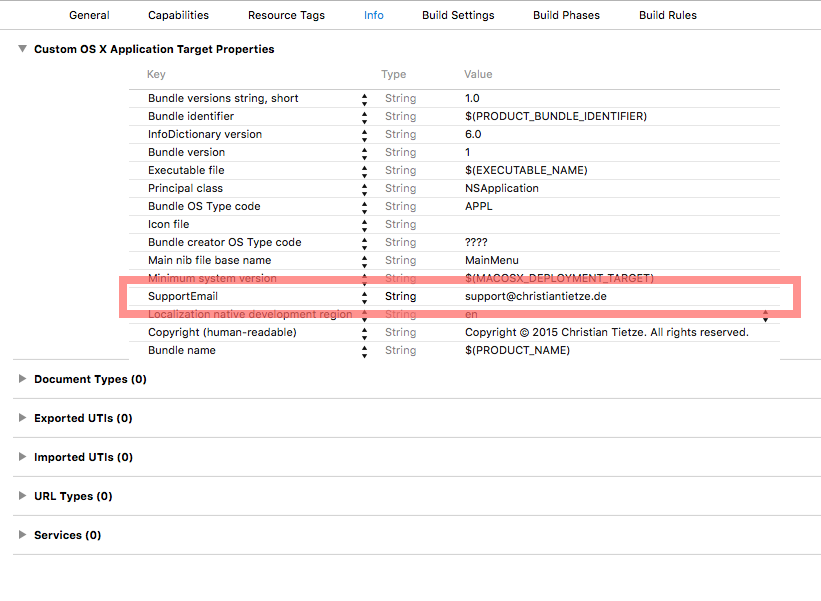b Sooner or later, every program crashes or does something weird. Even when the app can recover, it's best to make the user report problems sooner or later.
Instead of deferring this until later ...
do {
try managedObjectContext.save()
} catch let error as NSError {
fatalError("\(error)") // TODO report crash
}... drop in this micro-framework and have the proper handling in place. You can still worry about the "how" of reporting errors later. But now you will know that errors are handled:
do {
try managedObjectContext.save()
} catch let error as NSError {
applicationError("Saving MOC failed: \(error)")
// Optionally help the user rescue the data:
// saveManagedObjectContextChangesToPlist(managedObjectContext)
return
}Set up the reporter at the beginning of your app. You can do this during bootstrapping or simply call this in AppDelegate:
import ErrorHandling
func bootstrapErrorReporting() {
ErrorAlert.emailer = TextEmailer()
}The default TextEmailer expects your e-mail address in your app's Info.plist under the key "SupportEmail". Simply add this key with a string value to make it work.
The framework includes:
ErrorAlertto display alerts with an error message, informing the user about what happened.TextEmaileris the default handler of errors. It simply uses themailto:protocol to send a mail with the system's default e-mail program. You can drop in anything you'd like as replacement which conforms to theReportEmailerprotocol.
All you have to do is call:
let error: NSError = ...
ErrorAlert(error: error).displayModal()And you're set.
The Report type allows you to wrap any Error with a custom string that should be sent along with the report email.
let error: Error = ...
let logs = previousLogMessages.joined(separator: "\n")
let report = Report(error: error, additionalInfo: logs)
ErrorAlert(report: report).displayModal()If you happen to use SwiftyBeaver for logging, here's a InMemoryDestination that keeps track of the past log messages so you can send them along in your report:
import SwiftyBeaver
class InMemoryDestination: BaseDestination {
var maxHistory = 5
fileprivate(set) var messages: [String] = []
override func send(_ level: SwiftyBeaver.Level, msg: String, thread: String, file: String, function: String, line: Int) -> String? {
let formattedString = super.send(level, msg: msg, thread: thread, file: file, function: function, line: line) ?? "\(msg) (formatting error!)"
messages = Array(messages
.appending(formattedString)
.suffix(maxHistory))
return formattedString
}
}Because doing this sucks for unexpected errors, I add something to my projects so I can simply do this:
let error: NSError = ...
fatalApplicationError("Start-up failed: \(error)")
Or this, to handle cases when I'm stupid:
programmerError("Unhandled and unexpected exception!!11 \(error)")Or this, when something that may regularly go wrong goes wrong but isn't handled properly, yet:
// Think of it like a feature request! :)
applicationError("File not found: \(error)")Here's some code to achieve just that, as a bonus:
import Foundation
let errorHandler = ErrorHandler() // This is just for demonstration, of course
@noreturn func fatalApplicationError(message: String, function: String = __FUNCTION__, file: String = __FILE__, line: Int = __LINE__) {
applicationError(message, function: function, file: file, line: line)
fatalError(message)
}
func applicationError(message: String, function: String = __FUNCTION__, file: String = __FILE__, line: Int = __LINE__) {
let error = ErrorHandler.errorWithMessage(message, function: function, file: file, line: line)
errorHandler.handle(error)
}
func programmerError(message: String, function: String = __FUNCTION__, file: String = __FILE__, line: Int = __LINE__) {
let error = ErrorHandler.errorWithMessage("Program fault:\n \(message)", function: function, file: file, line: line)
errorHandler.handle(error)
}
public class ErrorHandler {
static let exceptionDomain = "de.christiantietze.MyNextApp.exception"
static var functionKey: String { return "\(exceptionDomain).function" }
static var fileKey: String { return "\(exceptionDomain).file" }
static var lineKey: String { return "\(exceptionDomain).line" }
public init() { }
}
extension ErrorHandler {
public func handle(error: NSError?) {
if let error = error {
logError(error)
reportError(error)
}
}
private func logError(error: NSError) {
NSLog("Error: \(error)")
}
private func reportError(error: NSError) {
ErrorAlert(error: error).displayModal()
}
public static func errorWithMessage(message: String? = nil, function: String = __FUNCTION__, file: String = __FILE__, line: Int = __LINE__) -> NSError {
var userInfo: [String: AnyObject] = [
functionKey: function,
fileKey: file,
lineKey: line,
]
if let message = message {
userInfo[NSLocalizedDescriptionKey] = message
}
return NSError(domain: exceptionDomain, code: 0, userInfo: userInfo)
}
}The package does not collect or store any data.
The TextEmailer relies on the user's email client to send an email to your support inbox, so it doesn't process the user's email at all.
Copyright (c) 2015 Christian Tietze. Distributed under the MIT License.
See LICENSE file for details.

